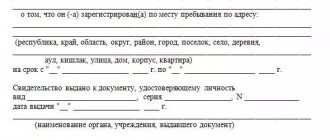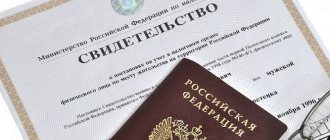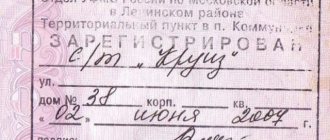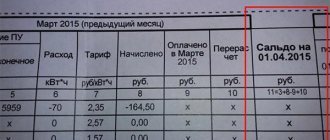Often the actual residential address and the registered address at the place of residence differ. It is very important to understand how the concepts under consideration differ and how they are similar.
What is it - the actual address of residence and the address of registration, how the above terms are characterized, what are their features - we will look at all this in the article. This is necessary in order to avoid misunderstandings in the future, since citizens face an administrative fine for violating registration rules.
Actual residence address: what does it mean?
The institution of registration existed in the Soviet Union and even before its appearance. It was permissive. In 1991 it was declared unconstitutional. Instead, another procedure appeared - registration at the place of residence.
Important! Despite the fact that registration in Russia has long been abolished, citizens of the country are still obliged to inform government agencies about where they live.
After the abolition of registration, temporary and permanent registration appeared, as well as the concept of “address of actual residence.” This is the living space in which a person actually lives most of the time. Moreover, this means the place where the citizen actually lives, and not according to documents.
People can live in various categories of residential premises:
- apartments;
- residential buildings;
- other types of residential premises.
Reference! It is absolutely not necessary for a person to have ownership rights to the premises in which he actually lives. He may have a variety of reasons for this: a lease or rental agreement, family ties with the owner of the property or close relationships with him. Even just permission from the owner of the property is theoretically quite enough for it to be considered a place of actual residence.
It is also useful to read: Permanent residence
Missing and declared dead - why are people recognized as such?
There are situations in life where people disappear. No matter how grief-stricken the relatives may be, they are forced to decide to formalize an inheritance, apply for a survivor’s pension for dependents, and dissolve the marriage with the disappeared person.
For this purpose, the law provides for judicial procedures:
- recognition of a missing person as missing - 1 year after receiving the latest information about the person;
- for deceased - 5 years after appearing in the place of residence.
Interested parties file a claim.
Place of stay and place of actual residence: differences
Documents often contain several columns for indicating different addresses. This leads to confusion, because a person does not know where and what should be entered. But dealing with this point is not at all difficult.
Free legal consultation
+7 800 100-61-94
It is also useful to read: Registration of citizens by place of residence and place of stay
Place of residence is an apartment or other housing where a person permanently resides and is registered. It is also commonly called constant. In fact, this is an analogue of permanent registration that existed in the past. A note about this type of registration is made in the citizen’s passport. They place it in departments of the Main Directorate for Migration and Migration or passport offices.
Important! Although registration is of a notification nature, this does not mean that it is not mandatory. Its absence in some cases can cause various problems for a person.
The place of stay is also a living space, but a person lives in it temporarily. For example, this could be a hotel room, a rented apartment in another constituent entity of the Russian Federation, etc. This residential property is registered temporarily, for which a corresponding certificate is issued in the form of a separate document. Some consider such registration to be analogous to the temporary registration that previously existed in the past.
It is also useful to read: Features of a temporary residence permit and how to obtain it
This video explains how to make temporary registration at your place of stay:
Reference! Temporary registration does not in any way replace or cancel permanent registration. They can exist simultaneously. When registering, a person is not deregistered at his permanent registration address. Many people forget about this.
The actual residential address is the place where a person directly lives. It does not matter whether he has registration in this residential premises or not. On the contrary, quite often this concept is used to refer to the address where a person lives, but is not registered for various reasons.
Important! In most cases, you can contact government agencies and receive various documents from them not only at your permanent or temporary registration address, but also at your place of actual residence. This norm is enshrined at the legislative level. For example, this is quite acceptable when applying for the disposal of maternity capital.
How can a foreigner extend his stay in the Russian Federation?
Is it possible to extend the temporary registration period?
When the period of the official residence permit is about to expire, a foreigner can act in several ways to renew it:
- the simplest and most unpopular method is to leave the country for 3 months and then cross the border again;
- a troublesome, but also providing good prospects, method is official employment in an enterprise or organization under an employment contract.
Do the addresses have to match?
Population migration within modern Russia occurs constantly. Some people move to another city or even region permanently, others only for a while, and still others spend most of their lives moving between different parts of the country. The state does not particularly prevent this, although it does require in certain situations to report a change in the place where a person lives. Especially when it comes to permanent residence.
Quite often, people find themselves permanently registered in one city, have temporary registration in another, and actually live in a third. There's really nothing wrong with that. The address of actual residence and place of residence do not have to coincide at all.
Moreover, the addresses of permanent and temporary registration cannot coincide at all. It just doesn't make sense. If a person is already permanently registered in the same apartment (house), then why also temporarily register in it.
The address of actual residence and permanent registration may also not match. Moreover, in the following cases, temporary registration may also be absent or issued in a completely different place:
- The person actually continues to live in the same region where he has permanent registration. There is nothing wrong with this and there will be no violation of the law. He is not required to obtain a temporary certificate of residence in another place.
- In fact, a person will live in another region for less than 90 days. In this case, the law also does not require submitting any additional notifications to the Main Directorate for Migration and Migration or other government agencies.
- A person does not need to register temporarily if he is registered in Moscow, but actually resides in the Moscow region or vice versa. The situation is similar with other cities of federal significance. There is no need to obtain temporary registration for persons permanently registered in the Republic of Crimea, but living in Sevastopol, or registered in St. Petersburg, but actually living in the Leningrad region. This rule will also work in reverse.
At the address of actual residence, regardless of whether it coincides with the place of registration or not, you can receive the following types of government services:
- register your child in kindergarten or school;
- obtain a foreign passport (but the time frame for issuing it will be longer);
- apply for a pension (if you do not have permanent registration);
- seek medical help;
- change your Russian passport (for example, upon reaching the age of 20, 45 years);
- obtain a driver's license;
- register the vehicle after purchase;
- apply for the use of maternity capital.
Grounds for deregistration at place of residence
Situations leading to the revocation of a “passport” place of residence are given in Art. 7 of Law 5242-1:
- change of place of residence;
- loss of property/possession rights, eviction - occurs by court decision;
- seizure of real estate and sale at auction for debts;
- fictitious or fraudulent registration;
- death, recognition as dead.
Any of these cases must be supported by a documentary basis, an evidentiary basis when canceling registration by the authorities.
Documents confirming residential address
It is easy to confirm your residential address if you have permanent registration at it using your passport. A corresponding mark is made in it. It is affixed by employees of the Main Directorate for Migration Affairs or the passport office. The mark also indicates the date when the person was registered in this residential premises.
The fact of residence at the temporary registration address can be easily confirmed with the help of an appropriate certificate. It is issued by GUVM employees when registering a person.
Sometimes it is necessary to confirm a residential address where there is neither temporary nor permanent registration. Usually this can be confirmed with the help of an act drawn up by a commission of at least 3 people. Sometimes you can also try to confirm this fact using one of the following documents:
- bills for gas, electricity, and other utilities (provided that the full name is indicated);
- certified statements from bank accounts, provided they contain information about the address and full name;
- various official documents (for example, orders of bailiffs), if they are sent to the address of actual residence, and there is a corresponding note about this.
Registration of foreign citizens and stateless persons
Features of temporary registration of foreign citizens and stateless persons
This contingent is subject to mandatory special registration if they stay at a specific address for more than 7 days.
The general rules are:
- a foreigner enters privately for a long period by invitation;
- the hassle of registering falls on the inviting party;
- The basis for registration is the migrant's card and international passport.
After entering the territory of the Russian Federation, an immigrant fills out a temporary registration form for foreign citizens and sends it by mail or in person to the migration division of the Ministry of Internal Affairs.
They can refuse on the following conditions:
- lack of residence on the territory of the Russian Federation;
- when a citizen of another state visits the country to work on a rotational basis.
Fines for violations of the law
For violation of registration rules, a fine of 2-3 thousand rubles is provided. (in MSK and St. Petersburg - 2-5 thousand rubles) . But if we are talking about rented housing, then sanctions will be applied to both the tenant and the landlord, and their amount will be 2-5 thousand rubles. (in Moscow and St. Petersburg - 5-7 thousand rubles) .
Important! For owners - legal. fines for individuals are higher and can reach up to 800 thousand rubles.
The address of actual residence is the place where a person actually lives. It may coincide with the place of temporary and permanent registration or not. It is required to be indicated in various documents, for example, when enrolling a child in a school other than registration. But it is important to remember that despite the notification nature of registration, there are fines for violating its rules, and quite significant ones.
Features of temporary registration in certain regions and cities
Temporary stay restrictions
There are territories and areas where a regime for the presence of citizens has been established. Here are the restrictions on temporary stay:
- border strips;
- closed military settlements;
- closed administrative-territorial regions;
- environmental disaster zones;
- regions with the risk of spreading epidemics of infectious and non-infectious diseases with the introduction of limited visits and special business conditions;
- territories under martial law or emergency situations.
In the first four groups, special regulations are valid indefinitely, in the remaining ones - for a limited time, depending on the decisions of local authorities.










